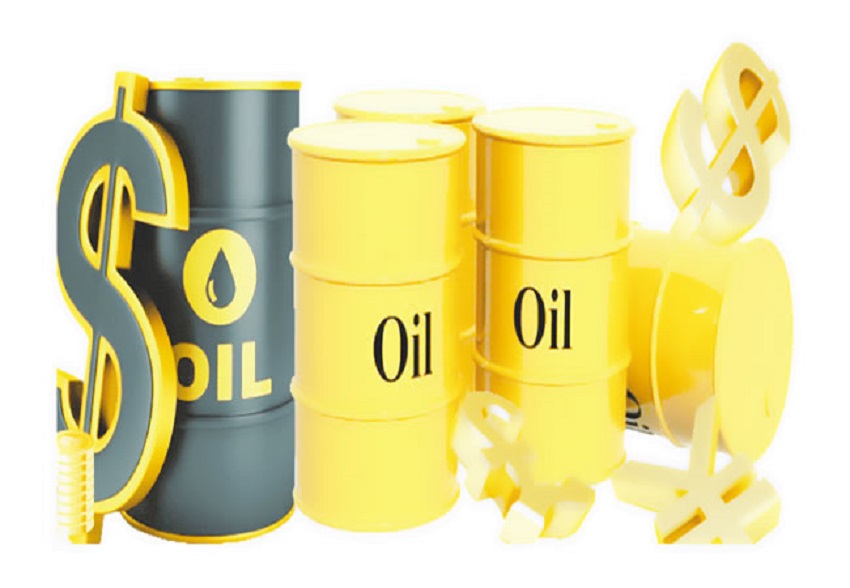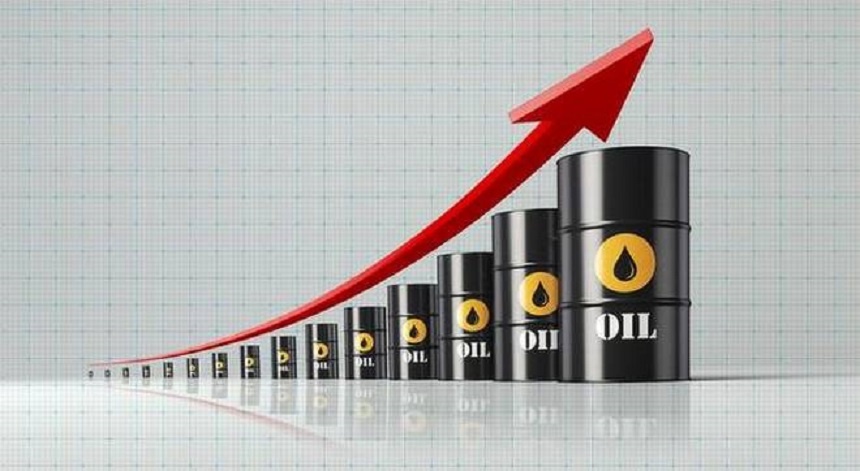Economy
Oil Rises on Strong China Demand, Supply Cuts

By Adedapo Adesanya
Oil rose on Friday and posted a weekly gain as higher Chinese demand and supply cuts from the Organisation of the Petroleum Exporting Countries and its allies (OPEC+) lifted prices.
Brent crude gained 94 cents to settle at $76.61 a barrel, while the US West Texas Intermediate (WTI) crude rose $1.16 to $71.78 per barrel.
On a week-on-week basis, Brent appreciated by 2.4 per cent, and WTI improved by 2.3 per cent.
Oil has gained this week on hopes of growing Chinese demand. China’s refinery throughput rose in May to its second-highest total on record.
There are also expectations that Chinese demand to keep climbing during the second half.
Kuwait Petroleum Corporation (KPC) sees continued good demand for oil from China in the second half of the year, according to its chief executive, Sheikh Nawaf Saud al-Sabah.
Kuwait, an OPEC producer, has been boosting oil product exports to Europe, Africa, Asia and the Americas after the sanctions on Russia reshuffled energy trade routes.
Also supporting crude are the voluntary output cuts implemented in May by OPEC+, plus an additional cut by Saudi Arabia in July.
Meanwhile, Russian Energy Minister Nikolai Shulginov said it was “realistic” to reach oil prices of around $80 per barrel.
He also said Russian oil and gas condensate production is expected to fall by around 20 million tonnes (400,000 barrels per day) this year, reiterating the country’s expectations.
Another OPEC member, Iran, saw its crude exports and oil output hit new highs in 2023 despite sanctions from the United States.
Capping oil price gains was the prospect of rising interest rates, which could slow economic growth.
The Bank of England is set to raise interest rates by a quarter of a percentage point next week. The European Central Bank lifted rates to a 22-year high on Thursday, and the US Federal Reserve signalled at least a half of a percentage point increase by year-end.
Oil rigs in the US fell by four to 552 this week, their lowest since April 2022, while gas rigs fell by five to 130, their lowest since March 2022, energy services firm Baker Hughes Co. said.
Economy
NGX Investors Gain 0.34% on Interest in Consumer Goods Stocks

By Dipo Olowookere
The portfolios of investors at the Nigerian Exchange (NGX) Limited increased by 0.34 per cent on Monday on the back of buying interest in consumer goods stocks and others.
Business Post observed bargain-hunting activities across the key sectors of the bourse, though the industrial goods index came under profit-taking, causing it to close lower by 0.57 per cent.
However, this did not affect the general outcome of Customs like it did last Friday.
The consumer goods industry went up by 1.31 per cent, the commodity space rose by 0.84 per cent, the energy counter appreciated by 0.69 per cent, the insurance sector grew by 0.52 per cent, and the banking index improved by 0.04 per cent.
As a result, the All-Share Index (ASI) was up by 363.13 points to 106,116.18 points from 105,753.05 points and the market capitalisation increased by N229 billion to N66.694 trillion from N66.465 trillion.
Investor sentiment was bullish yesterday as the bourse ended with 47 price gainers and 16 price losers, indicating a positive market breadth index.
International Breweries soared by 10.00 per cent to close at N8.47, Legend Internet appreciated by 9.97 per cent to N7.50, Cadbury Nigeria advanced by 9.96 pr cent to N29.25, Fidson grew by 9.95 per cent to N20.45, and Eterna chalked up 9.90 per cent to sell for N43.85.
Conversely, Livestock Feeds lost 10.00 per cent to settle at N8.55, Aradel declined y 9.86 per cent to N448.00, Tripple Gee fell by 9.60 per cent to N1.79, John Holt depreciated by 7.94 per cent to N5.80, and Linkage Assurance slumped by 6.15 per cent to N1.22.
During the session, the market participants traded 500.6 million stocks valued at N12.1 billion in 17,637 deals versus the 428.1 million stocks worth N20.2 billion in 14,284 deals, representing a shortfall in the trading value by 40.10 per cent, and a surge in the trading volume and number of deals by 16.94 per cent and 23.47 per cent, respectively.
Access Holdings was the most active equity for the day with a turnover of 60.9 million units valued at N1.2 billion, Fidelity Bank traded 56.1 million units worth N1.1 billion, UBA exchanged 34.5 million units for N1.2 billion, GTCO transacted 33.5 million units valued at N2.2 billion, and Nigerian Breweries sold 28.3 million units worth N1.2 billion.
Economy
Brent Trades $65 Per Barrel on Mounting Economic Worries

By Adedapo Adesanya
The price of the Brent crude oil grade declined by $1.01, or 1.5 per cent on Monday to $65.86 per barrel as economic worries from the US-China trade war pressured demand.
Also, the US West Texas Intermediate (WTI) crude was sold at $62.05 a barrel after it went down by 97 cents or 1.5 per cent amid conflicting signals from US President Donald Trump and the Chinese government over what progress was being made to de-escalate a trade war that could weaken global growth.
According to market analysts, the US-China trade war is dominating investor sentiment in moving oil prices, and has overshadowed other developments, including nuclear talks between the US and Iran and possible friction within the Organisation of the Petroleum Exporting Countries and its allies (OPEC+).
On Monday, China lashed out at the US’ negotiating tactics, with Zhao Chenxin, deputy director of the National Development and Reform Commission, saying: “They make up bargaining chips out of thin air, bully and go back on their words.”
The Chinese official was responding to President Trump’s statement earlier in the day that the US would not lower tariffs on China unless it offered up “something substantial”.
This came as US Treasury Secretary Scott Bessent on Sunday did not back President Trump’s assertion that negotiations with China were underway.
Amid this, crude oil inventories in China rose to the highest in almost three years in March, suggesting demand growth was lagging behind refinery processing rates, which hit a one-year high last month as Chinese oil processors took advantage of cheap Iranian and Russian crude.
It was reported that 1.74 million barrels daily went into storage last month in China, citing official data from China, making this the highest rate of storage inflows since June 2023.
Some OPEC+ members are expected to suggest that the group accelerate oil output hikes for a second consecutive month when they meet on May 5.
Earlier this month, there was an unexpected decision by OPEC+ to increase output by 411,000 barrels per day of oil in May, which was three times more than the group originally planned.
Economy
Nigeria’s Non-Oil Exports Grow 24.75% to $1.791bn in Q1 2025

By Adedapo Adesanya
The Nigerian Export Promotion Council (NEPC) has announced a 24.75 per cent increase in the value of the country’s non-oil exports, reaching a total of $1.791 billion in the first quarter of 2025.
It stated that the amount surpassed the $1.436 billion generated in the first quarter of 2024.
The Executive Director of the council, Mrs Nonye Ayeni, disclosed the figures while addressing the journalists in Abuja on Monday.
She said the significant growth reflects the resilience and diversification of Nigeria’s export sector beyond crude oil, a shift aimed at reducing the country’s reliance on oil revenue.
According to her, the surge in non-oil exports was driven by increased economic activity in the Agriculture, Manufacturing, and Solid Minerals sectors.
On the US 14 per cent trade tariff, the council says it was positive for the country, adding that it was an opportunity to focus on value addition and increased competitiveness in the global market.
Recall that Nigeria has reiterated plans to boost its non-oil revenues with the Minister of Industry, Trade and Investment, Mrs Jumoke Oduwole, saying the country was stepping up its diversification efforts.
Earlier this month, the Trade Minister said the nation would tackle this challenge with pragmatism, aiming to boost non-oil exports and strengthen economic resilience under President Bola Tinubu’s Renewed Hope Agenda.
Mrs Oduwole had said the US remains a key partner, with bilateral trade reaching N31.1 trillion from 2015 to 2024.
The measures taken by the US presents destabilising challenges to price competitiveness and market access, especially in emerging and value-added sectors vital to our diversification agenda,” the minister explained.
“Government is implementing a range of interventions in policy, financing, infrastructure, and diplomacy to help Nigerian businesses remain competitive amidst regional and global tariff hikes,” Mrs Oduwole said as she outlined Nigeria’s response.
-

 Feature/OPED5 years ago
Feature/OPED5 years agoDavos was Different this year
-
Travel/Tourism9 years ago
Lagos Seals Western Lodge Hotel In Ikorodu
-

 Showbiz2 years ago
Showbiz2 years agoEstranged Lover Releases Videos of Empress Njamah Bathing
-

 Banking7 years ago
Banking7 years agoSort Codes of GTBank Branches in Nigeria
-

 Economy2 years ago
Economy2 years agoSubsidy Removal: CNG at N130 Per Litre Cheaper Than Petrol—IPMAN
-

 Banking2 years ago
Banking2 years agoFirst Bank Announces Planned Downtime
-

 Sports2 years ago
Sports2 years agoHighest Paid Nigerian Footballer – How Much Do Nigerian Footballers Earn
-

 Technology4 years ago
Technology4 years agoHow To Link Your MTN, Airtel, Glo, 9mobile Lines to NIN

















